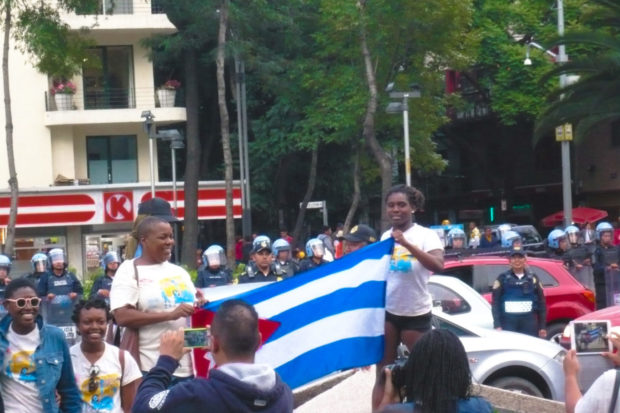
By Leni Reeves
One of our Fresno participants in the Pastors for Peace Caravan to Cuba commented about his trip to Cuba: “I’ve never felt so safe.” He was at the Black Lives Matter demonstration on Aug. 10 when he said this. Remarkably, all four Fresno area participants in this year’s Caravan independently went to this action without any prior communication or arrangement.
For the caravanistas, our most recent prior demonstration was in Mexico City on July 16 when we joined in a Cuba Solidarity demonstration in front of the U.S. embassy. The large crowd listened to speakers like the Bishop of Saltillo and Rosario (Chayo) Hernandez, the head of the Organización Popular Francisco Villa de Izquierda Independiente, our hosts. Then the police began to arrive in huge numbers, lined up shoulder to shoulder behind their riot shields completely surrounding this peaceful gathering.
Father Luis Barrios of Pastors for Peace took the mic: “I have a direct line to God and to the President of Mexico,” he said, “and I told him to send all the Communist police and all the Christian police so they could hear this message and join our ranks.”
A group of us, mostly African- American women from New York via Haiti, took the Cuban flag and displayed it in the faces of the police line. It didn’t feel safe, but it was Mexico DF, not Ayotzinapa, and we’re OK. Fresno didn’t feel safe with police surrounding the demonstration, but they decided on a “deferred bust” policy this time. The bogus charges were delivered later or will be in the mail.
So what feels so safe in Havana?
Part of feeling safe is just the general nonviolence of ordinary Cuban life. This is even more obvious for a woman; you are just not at risk out late on the street, or on the bus, or even in a jitney cab when the other women get out and there’s just a couple of big guys left in the car. This can be hard to get used to. Why is it like this? Not only the law but also the general organization of society is protective, for fairly complex reasons like education and accountability, and the relative absence of violence used as entertainment, and the absence of drug sales. (This doesn’t mean Cuba is crime-free; keep a hand on your wallet in the bus.)
Part of it is the absence of official violence. Police exist, and they do “card” people and check what folks are up to, sometimes when they shouldn’t. Although there is no structural racism, attitudes might persist, and young Black men (who is considered Black in Cuba is a whole other complex subject) are most likely to get questioned by police. But as my friend Manolo, originally from New York but now living in Cuba while he attends seminary in Matanzas, pointed out, “I’m in the demographic that has most contact with police, but I’ve never had a policeman in Cuba threaten me, point a gun at me, make me lie on the sidewalk, hurt or sexually abuse me. All these things have happened in the US.”
Police in Cuba are not an alien hostile occupying force in the communities. And don’t say that “the press in Cuba is controlled; you wouldn’t know if it happened.” The press in the United States is controlled, and the way we know what really happens is by communicating with each other. Ever hear of “Radio Bemba”? Cubans have some of the loudest mouths in the world, and not much gets past them.
Part of it is the absence of the violence of poverty. The violence of poverty includes all the illness and deaths from preventable causes and untreated medical conditions, all the malnutrition deaths, the people who suffer from having no work and no place to live, and those who are imprisoned victims of the war on drugs. It includes the “austerity” and “structural adjustment” that destroy public health systems and school systems and worker organizations and safety and health regulations that throw people out of work and leave them no hope and no future.
The financial rulers of the world don’t get excited about the suffering and death from the violence of poverty, and they don’t want you to notice these things either. They want you to think violence is a broken window, while their policies kill millions. Cuba is poor enough; it’s an underdeveloped country economically. But it is one that has placed the highest value on the social debt—meeting the needs and demands of the people for education and healthcare and housing.
So come take a look for yourselves. Don’t worry about “seeing Cuba before it changes.” Cuba has been changing ever since the Revolution, which is a work in progress. And they’ve been thinking for all of that time how to deal with the United States, and it never did, doesn’t now and never will include letting corporate capital take over Cuba.
Before we forget: The blockade is still in place. It’s long past time to end this cruel immoral policy. Tell President Barack Obama, Sens. Dianne Feinstein and Barbara Boxer and Rep. Jim Costa (D–Fresno): End the blockade. Support Senate Bill 491, Lift the Trade Embargo on Cuba; Senate Bill 299, Freedom to Travel to Cuba; HR 664, Freedom to Travel to Cuba; and executive actions including instructing the U.S. representative to the United Nations to vote to condemn the blockade in the yearly UN vote.
And to end where we started: Black and Brown lives matter. Assata Shakur, living in freedom in Cuba, refers in her autobiography, ASSATA, to the Cuban people: “They stand with their hands on their hips, acting like they own the place. I guess they do. They’re not afraid.”
For more information, check out http://ifconews.org/ or search Pastors for Peace.
*****
Leni Villagomez Reeves is a local physician, Cuba Solidarity activist and volunteer firefighter. Contact her at lenivreeves@gmail. com.
